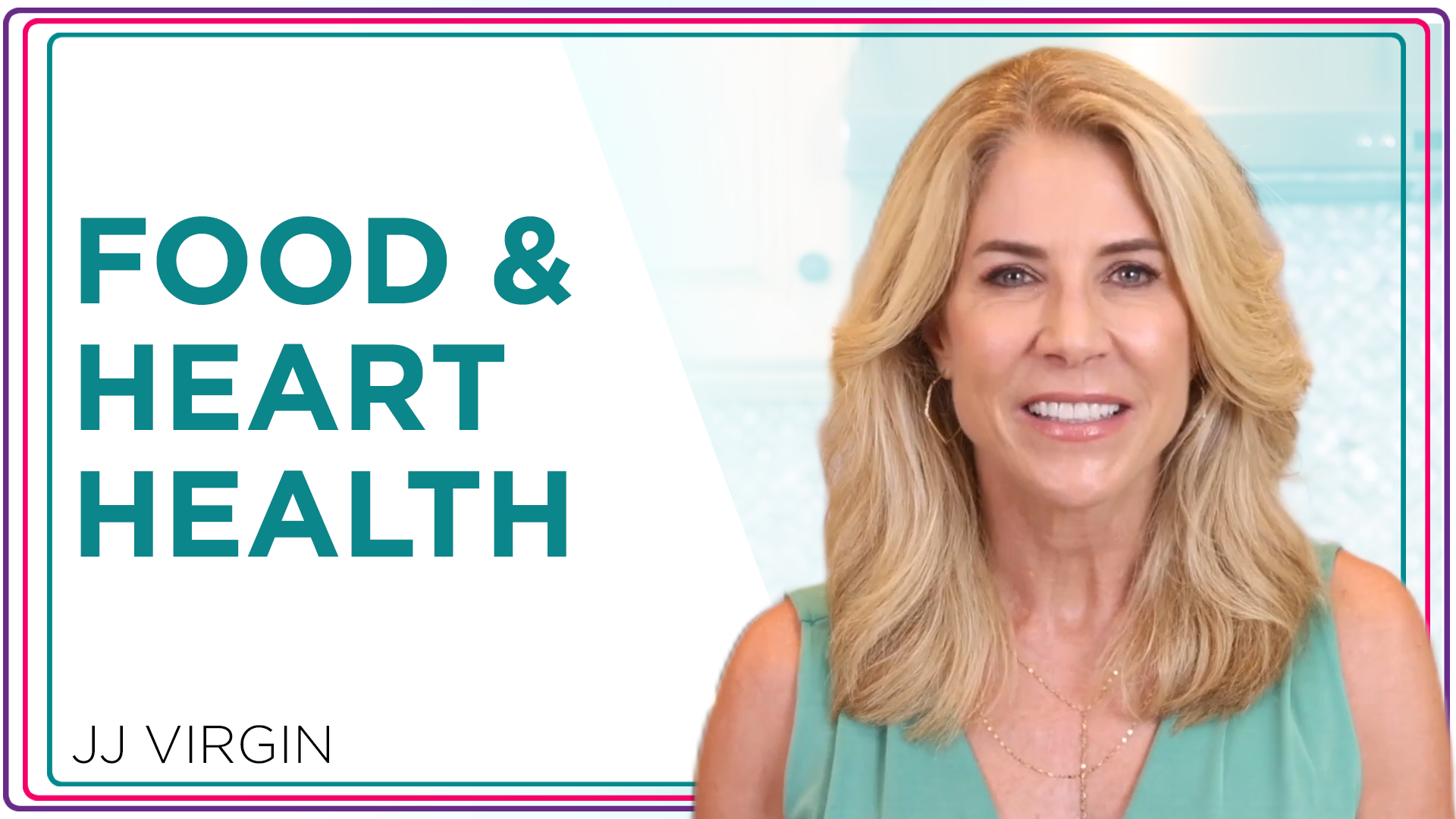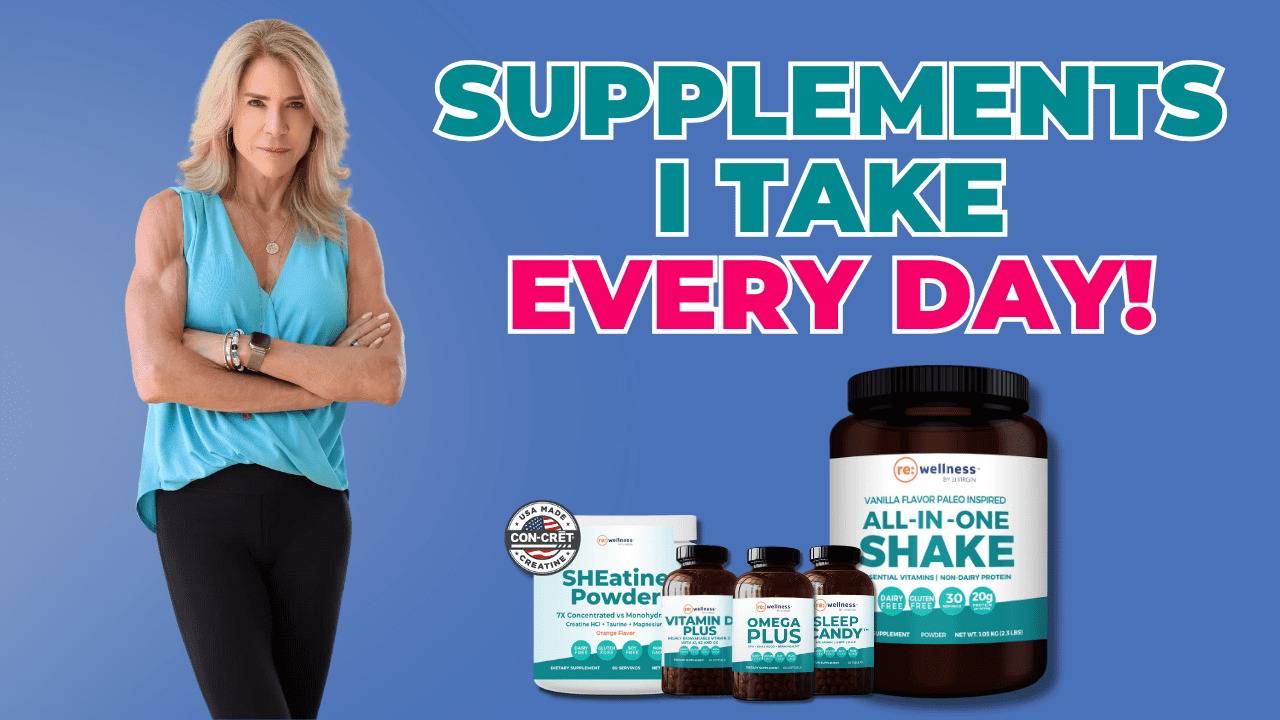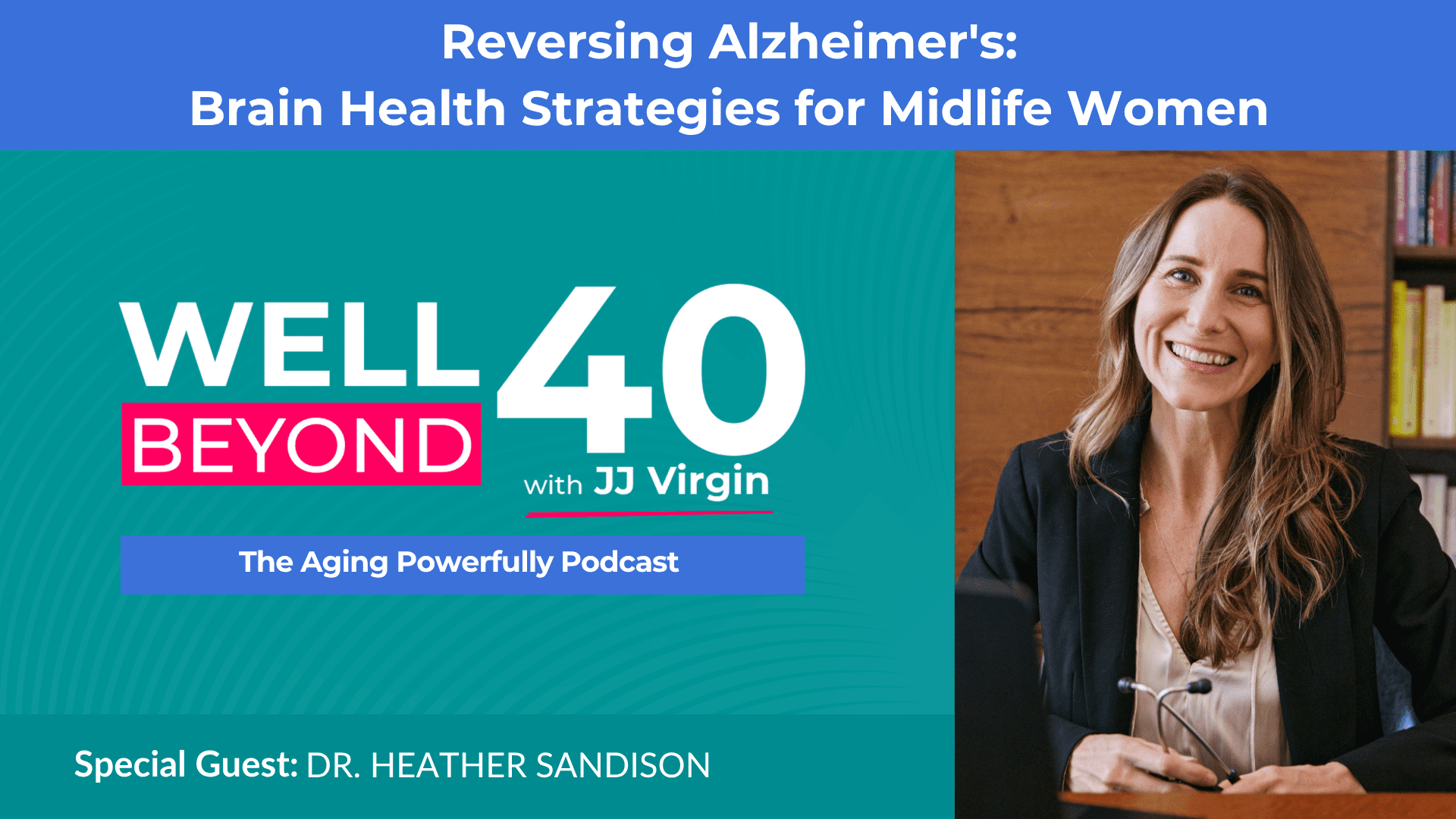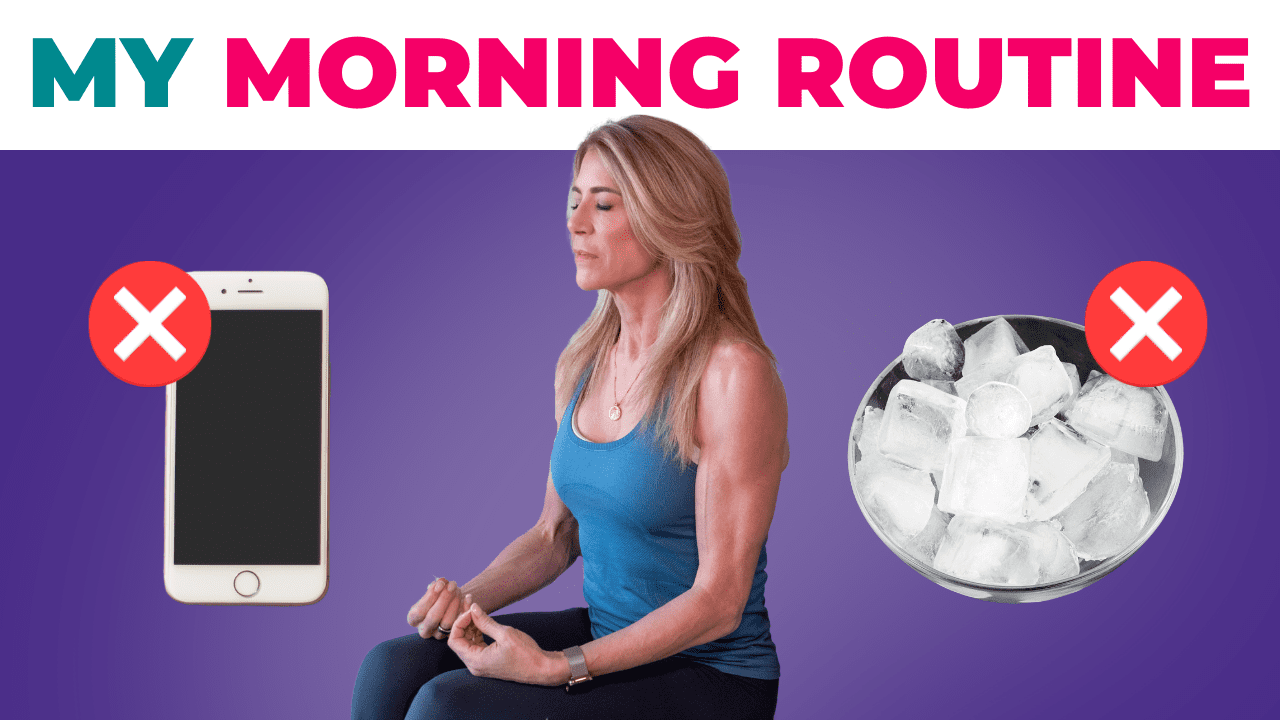The Best Diet + Lifestyle Hacks to Support A Healthy Heart
Supporting a healthy heart and reducing your risk of heart disease starts with what you eat. In this episode, JJ shares her top 5 needle movers for heart health. You’ll learn about the most important lifestyle risk factor for heart disease and stroke, the #1 thing you need to increase for a healthier heart, the best foods to help manage blood pressure, why low-fat diets are a disaster for heart health, and the best oil for a healthy life. Plus, JJ reveals why protein is critical, how wine can support heart health (if you choose this kind), how intermittent fasting impacts cardiovascular disease, and the most effective exercise to keep your heart healthy. Focusing on your heart health helps you make the most of your years… and this informative episode provides the tools you need to do that.
Mentioned in this episode:
Watch the FULL VIDEO on JJ’s Youtube Channel
Learn why heart disease is America’s #1 killer (but it doesn’t have to be)
Read more about omega-3 fatty acids
Get more omega-3 fatty acids with Omega Plus
Learn how much water you should be drinking daily
Learn how to fit fitness into your day
Meet your fiber quota with Extra Fiber
Learn more about cholesterol (and how to optimize your levels)
Learn why you’re probably not getting enough protein (and how to fix that)
Listen to JJ’s quick start guide to fasting
Click here for more information and offers from our sponsors
ATHE_Transcript_Ep 491_YT 41
JJ Virgin: [00:00:00] Hey, this is JJ Virgin. Thanks so much for joining me. This is Ask the Health Expert. In each episode, I put the Power of Health in your hands and share ways to get healthy, lose weight, heal your gut detox, and lots more. So you can look and feel better fast if you’d rather watch the video. Hey, I did put on my makeup and do my hair, so check it out on my YouTube channel.
When you think of love, I bet you think of your. So, how much do you love your heart? Did you know that heart disease is the leading cause of death for men and women in the United States? And what’s scary here, super scary is that quite often the first sign of it is a fatal heart attack. [00:01:00] So what are you doing to make sure you don’t become a statistic, especially that statistic?
Do you know what to eat, when to eat, and why do I have a heart that will keep you vital and strong for life? Well stick around till the end because in this video I’m gonna share my top four foods for a healthy heart. Hey, it’s JJ. I like to stay positive, but sometimes. You need a wake up call, and if you’re not doing everything you can to make sure your heart is healthy and strong.
Here it is. One person in the United States dies from cardiovascular disease every 36 seconds. Now that’s about 659,000 people each year, or one in every four deaths. More than four out of five cardiovascular deaths are due to heart attacks and strokes, and the number one most important lifestyle risk factor for heart disease and stroke is an unhealthy diet.
Now, if you’re lucky, you’ll get some signs like [00:02:00] high blood pressure, high blood sugar, and raised blood lipids. And if you’re overweight, that in itself is considered a risk. So a poor diet that’s been connected to heart disease is basically. The standard American diet, we call it the sad diet because that’s a diet where you’re eating lots of sugars, heavily processed foods, I call ’em dirty processed foods and damage seed oils, and that trifecta really skyrockets the risk of heart disease.
So what should you eat to reverse any developing heart disease and to protect and strengthen your heart for the rest of your life? Well, here are my top five needle movers for your heart. Number one, fiber. I mean, fiber does so many good things for your health in general, but it’s the main thing. You need to bump up if you want your heart healthier.
Research shows that a high fiber diet may help reduce the risk of cardiovascular disease. [00:03:00] Fiber slows down digestion so your, this system doesn’t have to work too hard. It helps keep you fuller longer, so you’re not as likely to overeat. It improves your blood sugar and cholesterol. It reduces inflammation and it slows aging.
I mean, that is quite a track record. I keep thinking like if this was a drug, it would be prescribed by everyone. So the general recommendation is to get 30 grams a day and apparently we’re getting not even half that. But I want you to take it even further than that. I’d really like to see you at at least 50 grams a day, and one way to do that first up is to pile a bunch of non-starchy vegetables on your plate at each meal.
So deep green leafys. They’re super high in fiber. They’re also high in vitamin K and nitrates, which can help reduce blood pressure and improve the function of your arteries. Studies show that eating a lot of leafy greens is associated with a lower risk of heart disease. So like I look [00:04:00] at this, and here’s my favorite one, two punch on this is I’ve recently gotten totally hooked on arugula.
I came back from Italy, it’s called rocket salad there, and I’ve like been kind of crazy on it, especially with great olive oil. You’re gonna hear it a little bit how important that is, but just look at how much of this you can get in. Let’s get five cups of deep green leafys in a day. I know that you can do this and it’s delicious.
Then next up, you’re gonna put a serving of beans or lentils on your plate, and maybe a handful of nuts. Now, beans alone have been linked to reduced blood pressure and inflammation, and of course, Both of these conditions are huge risk factors for heart disease, and beans also have resistant starch, and I love resistant starch.
It’s called that cuz it resists digestion and it feeds the good gut bugs, especially in the colon, helps raise something called butyric acid, which helps you burn more fat and also helps heal the gut. Now you can also supplement with Extra Fiber Plus, which makes it super easy to get a big hit of [00:05:00] fiber because it’s like something you can just throw into your loaded smoothie.
And it has a blend of soluble and insoluble fibers from fruits and veggies, and it also has that resistance starch. Now speaking of fruit, Berries are gonna be one of the best choices for your heart because not only are they a good source of fiber, they’re also loaded with antioxidants, which of course have been known to have a great impact on your heart health.
So, strawberries, blueberries, blackberries, raspberries. Pick your favorite. Mix ’em up. They’re all good because they also all have anthocyanins and Anthocyanins protects against oxidative stress and inflammation, and these are two things that contribute to heart disease. In fact, studies show that eating berries can reduce several risk factors for heart disease, including high cholesterol and high blood pressure.
And another study found that eating blueberries every day improved the function of cells lining blood vessels. . So, I mean, this is an easy one. No [00:06:00] one’s gonna get tortured adding some blueberries into your daily diet, right? And if you do that, that’s gonna help control blood pressure. All right, number two, healthy fats.
Now, I will tell you, it really blows my mind and irritates me to see this advice on a regular basis to eat a low fat diet for a healthy heart. I do not recommend this because low fat usually means high sugar. If you’re pulling the fat out, something’s gonna go in, right? I mean, what is it? You’re either eating a high fat diet or a high carb diet, and so quite often I see they pulled out the fat and they added the sugar.
there are bad fats and you wanna avoid the trans fats that you’ll see in processed foods and the damaged seed oils like canola and corn, and safflower and sunflower. but healthy, good fats, they do not make you fat, and they are super good for you. The research shows that omega-3 fats from [00:07:00] cold water, seafood, extra virgin olive oil and nuts can decrease your risk for a heart attack and stroke.
In fact, I was recently talking to Dr. Steven Gundry on a interview and he was talking. The blue zones and how they saw, I can’t remember the amount of risk reduction. It was something like 30% risk reduction for cardiovascular risk by doing a liter of olive oil A week. Holy smokes. Now, you can also get good fats and other delicious foods like seeds and dark chocolates and avocados.
In fact, avocados have been linked to reduced cholesterol and a lower risk of heart disease too. How awesome. And they’re also rich in potassium, which of course lowers your blood pressure and lowers your risk of. And then of course, fatty fish, salmon, sardines, halibut. They’re packed with omega-3 fatty acids, which may protect you from developing heart disease.
Now, if you don’t eat seafood three to four times a week, and even then you’re [00:08:00] probably gonna wanna supplement with a high quality fish oil like omega ultras, and you really wanna triglyceride form clean. Fish oil supplement. When you do that, it’s gonna give you the same benefits that fish oils and fish do.
It lowers your triglycerides. It improves your artery function, it decreases your blood pressure. All right, number three, clean, lean protein. And I am all about getting protein at every meal. But here’s the deal, you have to choose wisely. You do not wanna have junk food protein if you’re eating factory factory animals.
That’s junk food protein. You’ve gotta choose organic, clean, lean animal protein because what you eat ate. So that means grass fed and finish beef pasture raised chicken, Turkey and eggs. If you’re not intolerant, wild caught fatty fish. And of course with the wild caught fatty fish, you get the protein and you get the omega fats.
So the big thing [00:09:00] here, again, think of factory farm meats and, and eggs and dairy. Like the junk food of the protein category because you’ve got hormones added, you’ve got pesticides added, and you’ve got inflammatory fats added because of them being fed corn and soy and GMO feed. Now, if you’re a vegan, You’ve really gotta make sure you’re getting enough protein without overdoing the fatter carbs.
If you’re relying on beans, lentil seeds, and nuts and other things like that, especially the beans and the quinoa, you’re getting a lot of carbohydrates. In order to get enough protein, you may wanna make a habit of starting with a loaded smoothie break in your fast with my Reignite Wellness, all in one plant-based protein powder, because I know then you can get a big jump on your daily protein intake.
Easily without, again, overloading it with the fat and carbs. All right. Let’s talk drinks, shall we? Of course. You [00:10:00] wanna drink so that you stay hydrated, and that means lots of water. The next thing is caffeine. Now, green tea, if you’re doing caffeine, is a great choice here because the catechins catechins rather in green tea.
May have some vascular protective effects and green tea’s got some other amazing things. It’s got this theanine in it that can help lower stress hormones. It can help with insulin sensitivity. Also, feed is a good bacteria in the gut, so like a big fan of green tea. In fact, I drink it all throughout the day.
However, I’m very happy to tell you that coffee is also good because coffee has these great polyphenols, these great antioxidants now, not as amazing as tea, sadly, but it’s still one that is good for you, but you don’t wanna make a good thing bad. Do not take that coffee and dump in like some of those crappy.
Creamers or sweeteners deal. So let’s keep the coffee clean and then you can enjoy those polyphenols. Now, obviously the [00:11:00] thing you gotta stay away from are the sodas and the fruit juices, and don’t be fooled. While fruit can be healthy for you, if you unwrap it and turn it into juice, you just turn it into a soda.
So make sure that you do not do that. All right. What about alcohol? Good news on alcohols that a little red wine can be good for you because that resveratrol and some research now is shown that Vero can be linked to lower inflammation and less blood clotting, which can lower the risk of heart disease. However, you wanna be careful with what you’re choosing there.
I stick with Dry Farm wines. Because I don’t wanna get the additives or sugar that you might find in some of the United States wines. So make sure that you are keeping that good thing good and getting clean wine just like we’re doing clean protein. All right, now finally on a What to Eat, Just global note here.
When you eat for your heart, don’t forget to spice it up. So spices and herbs. When you look at these, we’ve used these traditionally in cultures for [00:12:00] all sorts of different things, but one of the things that can super helpful for is to use hot spices, curries and chilis. You probably never knew this. They can help block arterial plaque growth.
They can of course rev your metabolism and they can lower inflammation. . Now more and more research is showing that when you eat matters, especially. For heart health and specifically I’m talking intermittent fasting cuz the current human studies suggests that fasting can reduce the risk for cardiovascular disease because one, it helps you control your weight, it also helps control your blood sugar and it helps with getting you better with glucose tolerance, better blood sugar levels and insulin sensitivity and intermittent fasting might also increase a key protein that controls inflammation and protects the.
According to a new study published in the European Heart Journal, Open fasting improved scores on insulin resistance. And this is really important because insulin resistance can increase [00:13:00] blood sugar and lead to type two diabetes in metabolic syndrome, which then of course can increase your risk for heart attack and stroke.
And some studies even show that fasting lowers ldl, which can be that damaging small, dense, cholesterol. So that was the what to eat and when for your heart health. But sidebar, you can’t ignore fitness. You gotta do something to get your heart rate up every day. It might mean going for a walk, riding a bike.
Whatever fits your lifestyle, but you gotta fit it in, right? Fit that fitness in, and also fit in some resistance training to build lean muscle. And here’s why. When you build lean muscle, you immediately start to have better glucose tolerance, better insulin resistance. That is so key, and that’s how you’re gonna be able to start using more fat for fuel.
So you really wanna incorporate. That resistance training in two, to support your heart for staying younger and to help keep your weight under control. [00:14:00] So my recommendation here is aiming for 150 minutes a week as your floor. That’s like the baseline. We are meant to move. We need to move so much more.
And again, I start and I go, We need to move every single day. Do something, walk bikes, walk the stairs, move more, and then get that resistance training into and bonus points if you can do some mindful re stress, reducing things like some restorative yoga. Now all these things are gonna work together, not only give you the longest life.
But more importantly, like you wanna live a long life, well, right? It’s gonna be the best, most vital one possible too, cuz it’s all about quality of life and focusing on your heart. Health is gonna help you make the most of all your years. Thank you for joining me, and if you don’t know me, I’m JJ Virgin.
I’m a four times New York Times bestselling author. Big books for the Virgin Diet and the Sugar Impact Diet More come in there and a fitness hall of famer and I have [00:15:00] lots more I can share with you on how to help protect your heart, how to get healthy, especially metabolically healthy and lose weight if that’s your goal.
So check out the rest of my What to eat, When to eat, and why series. Four more. Thanks for being with me. I’ll see you next time.
For more info on this and other health topics I cover or to rate and review, find me on Instagram, Facebook, and my website, jjvirgin.com. And don’t forget to subscribe to my show so you won’t miss single episode. Go to subscribetojj.com. Thanks again for being with me this week.

 Subscribe to our show
Subscribe to our show 




